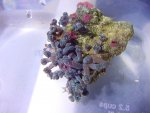Justin,
What Atlantis sells is Cespitularia which is non pulsing (like you said).
It is easy to tell the two apart, Cespitularia braches and this Xenia does not. This is a picture of my Cespitularia: http://www.thecoralnursery.com/newsite/ ... ia_md2.JPG
Adam,
I tried to find siphonozoids but didn't have any luck. They are reported to show up in more mature individuals and possibly seasonal so the lack of them is not conclusive. In either case neither Xenia or Heteroxenia are branching so that is not a determening factor between the two.
I am leaning towards a morph of X. umbellata which I find it most closely resembles in physical appearance (minus the color difference).
Rafael
What Atlantis sells is Cespitularia which is non pulsing (like you said).
It is easy to tell the two apart, Cespitularia braches and this Xenia does not. This is a picture of my Cespitularia: http://www.thecoralnursery.com/newsite/ ... ia_md2.JPG
Adam,
I tried to find siphonozoids but didn't have any luck. They are reported to show up in more mature individuals and possibly seasonal so the lack of them is not conclusive. In either case neither Xenia or Heteroxenia are branching so that is not a determening factor between the two.
I am leaning towards a morph of X. umbellata which I find it most closely resembles in physical appearance (minus the color difference).
Rafael







